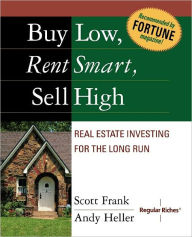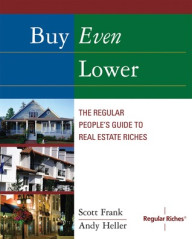Buy Low, Rent Smart, Sell High
$18.95
Description
Real Estate Investing for the Long Run Paperback – January 9, 2012
by Andy Heller (Author), Scott Frank (Author)
Facing a volatile stock market, many people have turned to real estate as a way to invest their hard-earned money. While many investors opt to buy property and then sell it quickly, other investors choose to hold onto their property for a longer period of time to realize a greater return on their investment. Real estate experts Scott Frank and Andy Heller have developed a proven and diversified program for real estate investing that incorporates both approaches and enables investors to take control of their financial futures and build wealth over time. Their new book, Buy Low, Rent Smart, Sell High: Real Estate Investing for the Long Run outlines a win-win-win program, one where average people can reap significant financial rewards by investing in real estate. * Win One: Buying Low – The investors first win occurs by purchasing real estate at a 10-20 percent discount by seeking out motivated buyers and avoiding paying agent commissions. The book reveals the secret to buying foreclosed homes with clean titles from banks and mortgage companies. * Win Two: Renting Smart – The property is rented through a lease/purchase agreement. Not only does the investor get a down payment from the lease/purchasee, but he or she also receives monthly rent that usually exceeds the monthly mortgage payment. Also, the lease/purchasee takes on the maintenance and repair responsibilities and tends to be a better tenant in return for their special lease/purchase terms. In addition, as the owner of the property, the investor is able to receive tax write-offs. * Win Three: Selling High – The final win results when the lease/purchasee exercises his or her right to purchase the property. The owner has realized the benefits of owning the property and has sold it to the lease/purchasee without agent commissions. If the lease/purchasee decides not to exercise his or right, the investor still wins because he or she can either extend the lease purchase agreement and increase the purchase price (based on property appreciation) or enter into another lease/purchase agreement with a new tenant and begin the cycle of wins all over.





